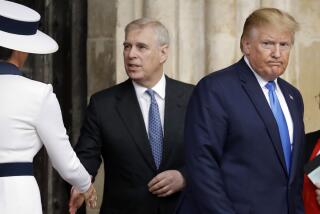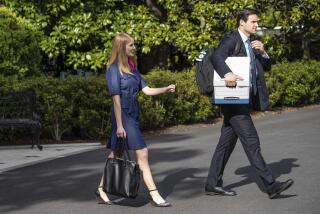New Questions Raised Over Willey’s Account
- Share via
WASHINGTON — Three days after a former White House aide riveted the nation with her televised account of an unwelcome sexual encounter with the president, information that could challenge her version of events continued to come to light Wednesday.
Information also emerged indicating that President Clinton took an active role in the decision to release correspondence that might discredit Kathleen E. Willey’s allegation that he had kissed and groped her near the Oval Office in November 1993.
An affidavit released Wednesday details the story of Willey’s close friend, Julie Steele, who said Willey asked her to lie to back up Willey’s account of her encounter with Clinton.
Steele, who has known Willey for 20 years, told Newsweek magazine last year that her friend had come to her house on Nov. 29, 1993, and told her that Clinton had fondled her and that she felt “humiliated.” Subsequently, Steele told the magazine that Willey had actually first told her of the White House meeting weeks later and that Willey had not been upset.
In a three-page affidavit she provided to Clinton lawyers on Feb. 13, Steele said that when Willey first discussed her meeting with Clinton, she “never said anything to suggest that President Clinton made sexual advances towards her or otherwise acted inappropriately in her presence.”
In early 1997, Steele said, Willey called her and requested that she meet with a Newsweek reporter. At that time, Steele said, Willey asked her to tell the reporter that she had come to Steele’s house directly from Washington in November 1993 and told her that “President Clinton had made sexual advances towards her, had ‘groped’ her, and had pulled at her clothing,” and that Willey was “upset,” “humiliated,” “disappointed” and “harassed.”
Steele said she corroborated Willey’s account on an off-the-record basis, but in July 1997, when she learned the magazine was going to publish a story, she recanted.
Asked about Steele’s allegation during her interview on the CBS News program “60 Minutes,” Willey responded: “My own personal belief is that she was pressured. . . . I think that the White House wanted to try to discredit me and they found a pawn in her.”
Steele has capitalized on her relationship with Willey; she sold a photograph of Willey and Clinton to the National Enquirer, which paid her $7,000 and flew her and her family to Florida.
Earlier this month, sources said, Steele told agents for independent counsel Kenneth W. Starr that Willey had twice before asked her to lie about romantic encounters and other matters not connected to Clinton, but the investigators displayed minimal interest in following up.
Neither Willey’s attorney nor a spokeswoman for Starr could be reached Wednesday night.
Separately Wednesday, a Richmond, Va., newspaper reported that in a sworn statement made three years ago, Willey did not mention an encounter with Clinton and said she “did not talk with anyone at the White House” about her financial plight.
In her interview with “60 Minutes” on Sunday, Willey said she approached Clinton about a paying job because of her husband’s financial straits.
Willey made the sworn statement in January 1995 in response to lawsuits brought by creditors after the suicide of her husband, according to the Richmond Times-Dispatch.
In Los Angeles, meanwhile, Michael Viner, president of New Millennium Entertainment, said the story Willey told on “60 Minutes” differed substantially from the version she had been attempting to sell him.
Viner said Willey’s attorney, Daniel Gecker, had led him to believe that her book would be about a friendship that survived the president’s interest in something other than a platonic relationship. In that version, Viner said, the president “may have made a pass” at Willey but stopped short of sexual “harassment.”
The disparity between the two versions shook his confidence in Willey’s credibility, Viner said. “When you do a book like that, you have to believe 100% in your author,” he said, “and I couldn’t do that after that.”
Viner told ABC’s “Good Morning America” that Gecker sought $300,000 for Willey’s story; in an interview with The Times, Viner said he initially thought the story was worth $100,000.
Also Wednesday, there was a brief crack in the curtain that has blocked the public’s view of what the president is doing to manage the controversy over allegations of sexual misconduct and cover-up.
In a deposition for an unrelated case, Clinton’s friend and political advisor James Carville testified Monday that the president had called him on Saturday to talk about whether it was a good idea to release the correspondence between himself and Willey.
“He said there was some letters that she had written, and they were--his lawyers--were considering, I think were considering about making them public, and what did I think about it?”
Asked what he had told Clinton, Carville said, “I’m not sure if I know what’s in there, but if it was something that was past the time that she made this allegation, it [releasing the letters] was probably a pretty good idea.”
Asked if the president had asked Carville to help publicize the correspondence, Carville said no.
Carville’s account is interesting because it shows Clinton in a hands-on mode making decisions about damage control.
But the president’s advisors said the episode does not show that the president is the mastermind behind efforts to discredit Willey’s account of a sexual encounter. The president’s aides have stressed repeatedly that his advisors and lawyers are handling the controversy. Clinton, they say, has remained focused on the affairs of the country.
Carville’s account “was a momentary glimpse that is not a full picture,” a senior White House official said Wednesday. “It’s not an isolated incident,” but it does not mean the president is behind the whole damage-control strategy.
“He talks to people [about the allegations]. But it’s not all he gets on the phone about. “He’s not in the day-to-day meetings on the scandal. We make the decisions,” the official said.
CBS News President Andrew Heyward told The Times on Tuesday that “60 Minutes” producers were not aware of Willey’s letters to Clinton before the White House released them on Monday. “We didn’t know about the letters,” Heyward said.
While noting that Clinton attorney “Bob Bennett had ample opportunity to tell” producers about the correspondence, Heyward declined to speculate on the theory that the White House deliberately withheld the letters until CBS broadcast the interview, which was seen by more than 28 million people.
Times staff writers Elizabeth Shogren and Jane Hall contributed to this story.
More to Read
Sign up for Essential California
The most important California stories and recommendations in your inbox every morning.
You may occasionally receive promotional content from the Los Angeles Times.










